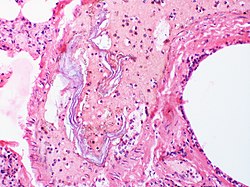Amniotic fluid embolism
Editor-In-Chief: Prab R Tumpati, MD
Obesity, Sleep & Internal medicine
Founder, WikiMD Wellnesspedia &
W8MD medical weight loss NYC and sleep center NYC
| Amniotic fluid embolism | |
|---|---|

| |
| Synonyms | N/A |
| Pronounce | N/A |
| Specialty | N/A |
| Symptoms | Shortness of breath, hypotension, coagulopathy, seizures, cardiac arrest |
| Complications | Disseminated intravascular coagulation, acute respiratory distress syndrome, multiple organ dysfunction syndrome |
| Onset | Labor, cesarean section, or abortion |
| Duration | |
| Types | N/A |
| Causes | Entry of amniotic fluid into maternal circulation |
| Risks | Advanced maternal age, placenta previa, preeclampsia, multiple gestation |
| Diagnosis | Based on clinical presentation and exclusion of other causes |
| Differential diagnosis | Pulmonary embolism, anaphylaxis, sepsis |
| Prevention | |
| Treatment | Supportive care, oxygen therapy, blood transfusion, mechanical ventilation |
| Medication | Vasopressors, corticosteroids |
| Prognosis | High mortality rate |
| Frequency | 1 in 40,000 deliveries |
| Deaths | N/A |
Amniotic Fluid Embolism (AFE) is a rare but serious and potentially fatal condition that can occur during childbirth. It happens when amniotic fluid, fetal cells, hair, or other debris enters the maternal bloodstream, leading to a severe allergic-like reaction and cardiovascular collapse. This condition is unpredictable and can lead to significant complications, including coagulopathy, cardiac arrest, and pulmonary edema.
Causes and Risk Factors
The exact cause of Amniotic Fluid Embolism is not well understood, but it is believed to occur when there is a breach in the physical barriers between the mother and fetus, such as the amniotic sac and the uterine veins. This allows amniotic fluid or fetal material to enter the maternal circulation. Risk factors for AFE are not clearly defined, but some studies suggest that advanced maternal age, cesarean delivery, placenta previa, and uterine rupture may increase the risk.
Symptoms and Diagnosis
Symptoms of Amniotic Fluid Embolism can be sudden and may include acute shortness of breath, hypotension (low blood pressure), seizures, and coagulopathy (a disorder affecting blood clotting). Diagnosis is primarily clinical, based on the presentation of symptoms and the exclusion of other conditions. There is no specific test for AFE, but certain laboratory findings, such as a sudden drop in oxygen saturation and coagulation abnormalities, can support the diagnosis.
Treatment and Prognosis
Treatment of Amniotic Fluid Embolism focuses on supportive care and managing complications. This may include oxygen therapy, fluid resuscitation, and blood transfusions to address hypotension and coagulopathy. In severe cases, mechanical ventilation or extracorporeal membrane oxygenation (ECMO) may be required. The prognosis of AFE varies; while some women recover completely, others may experience significant morbidity or mortality. Early recognition and aggressive management are critical for improving outcomes.
Epidemiology
Amniotic Fluid Embolism is considered a rare condition, though its exact incidence is difficult to determine due to variations in diagnostic criteria and reporting practices. It is a leading cause of maternal mortality in the developed world, contributing to a significant proportion of deaths associated with childbirth.
Prevention
Currently, there are no established measures for the prevention of Amniotic Fluid Embolism due to its unpredictable nature. Management strategies focus on rapid identification and treatment of symptoms to minimize complications.
Transform your life with W8MD's budget GLP-1 injections from $125.
W8MD offers a medical weight loss program to lose weight in Philadelphia. Our physician-supervised medical weight loss provides:
- Most insurances accepted or discounted self-pay rates. We will obtain insurance prior authorizations if needed.
- Generic GLP1 weight loss injections from $125 for the starting dose.
- Also offer prescription weight loss medications including Phentermine, Qsymia, Diethylpropion, Contrave etc.
NYC weight loss doctor appointments
Start your NYC weight loss journey today at our NYC medical weight loss and Philadelphia medical weight loss clinics.
- Call 718-946-5500 to lose weight in NYC or for medical weight loss in Philadelphia 215-676-2334.
- Tags:NYC medical weight loss, Philadelphia lose weight Zepbound NYC, Budget GLP1 weight loss injections, Wegovy Philadelphia, Wegovy NYC, Philadelphia medical weight loss, Brookly weight loss and Wegovy NYC
|
WikiMD's Wellness Encyclopedia |
| Let Food Be Thy Medicine Medicine Thy Food - Hippocrates |
Medical Disclaimer: WikiMD is not a substitute for professional medical advice. The information on WikiMD is provided as an information resource only, may be incorrect, outdated or misleading, and is not to be used or relied on for any diagnostic or treatment purposes. Please consult your health care provider before making any healthcare decisions or for guidance about a specific medical condition. WikiMD expressly disclaims responsibility, and shall have no liability, for any damages, loss, injury, or liability whatsoever suffered as a result of your reliance on the information contained in this site. By visiting this site you agree to the foregoing terms and conditions, which may from time to time be changed or supplemented by WikiMD. If you do not agree to the foregoing terms and conditions, you should not enter or use this site. See full disclaimer.
Credits:Most images are courtesy of Wikimedia commons, and templates, categories Wikipedia, licensed under CC BY SA or similar.
Contributors: Prab R. Tumpati, MD

